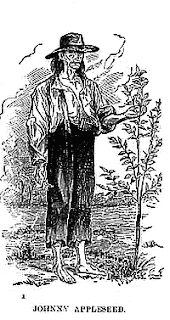"Remember when..."
Late June is a great time to be an American. Stories are told during the long, soft dusk. Lightning bugs almost make up for the skeeters. Talk swings from baseball to beans, passing through epic feats of failure, now funny stories weaved between births and deaths.
"Jodie's not so well... Gawd, how Anna has grown! 6 months?... Really? She barely shows....We're hanging on, barely....What a wedding!....Goodness, it's lovely out tonight....."
We laugh, we drink, we eat, we share.
Your children are not truly competing with the Chinese children or the Finnish children or the Indian children. Our children are now seen as chattel, penned in the same cell as any other child. They are all competing against an international corporate structure that protects their own children at the expense of all others.
No, it's not some sekrit international plot--it's just human nature gone amok....
It doesn't have to be this way. We got good earth, and water, and trees, for now. We have seas with fish, and plains with grain, for now. We have coal and wind and sunlight. We have a reasonably moderate climate, for now.
We also have a story, a good story, and a constitution, a good constitution. We have wonderful parables--Johnny Appleseed, Annie Oakley, John Henry. We're the goofy, kind folks who left our native lands, folks who can solve pretty much any problem tossed our way, in unexpected ways.
When did arrogance and efficiency and misplaced elitism become our story? Why do we care what Bill Gates and Eli Broad have to say? How does a man like Arne Duncan become the national figurehead for what used to be education?
When did we stop wanting to be Americans?
***
I'm not raising children to be chattel. A well-educated child, one who knows where she came from, knows her land, and knows what's possible, makes for a lousy slave.
There's a good reason literacy creates turmoil in tiered cultures.
Literacy takes time.
Education takes time and room.
Living well takes time and room and wisdom.
Our national leaders spent their lives rushing to "there" without ever knowing "here"--hard to love a land you know only abstractly. Hard to love
anything you know only abstractly. It's impossible to rightly care for something you don't know how to love.
Love of our land can start with the simple act of putting a bean seed in a recycled milk carton, filled with dirt scooped up by a child's hand from the ground next to the school building. It can start with a walk to the closest stream. It can start with listening to a grandmother describe what her town looked like a few decades ago, when people knew what a stoop was for.
Not sure growing a bean will help a child on the NJASK, our tithe to the NCLB nonsense. But I am sure of this:
A child who has a love of place, of life, of the universe has a better shot at happiness than one who does not. Few things are more dangerous than an educated adult with no sense of place. Right now they're running the show, and telling the tales.
***
You don't need a tinfoil hat anymore to be a conspiracy crank. Here's a headline from today's
Star-Ledger:
Last week we got this:
Chris Cerf, our Acting Commissioner of Education,
used to be the CEO of Edison Schools--ask him
how things went in Philly and Baltimore. He knows the problems. He's bright, he's personable, and I trust his heart is in the right place. I tend to trust a lot.
Yet here we go again. How does a bright man with an intimate role in the history of failed privatization of public schools keep doing what he does?
I have a hypothesis (hey, I'm a science teacher)--I suspect that he and those he hangs with share different stories, stories framed by private schools, hedge funds, and power. While Mr. Cerf was cutting his teeth as a teacher at
Cincinnati Country Day School, I was busy chelating lead poisoned kids in Newark.
Fancy day schools will pluck out an occasional child of color from the inner city--makes making the websites and pamphlets more, um, democratic. They won't be taking the child whose brain has been severely damaged by lead. They won't be taking the child whose life crises leave a legacy of outrageous behaviors.
They don't need to--it's not part of their story. They don't know those children even exist.
But I do.
To his credit, Mr. Cerf did spend some time with me, far more than I could have hoped for.
I don't want Zuckerberg's money, I don't want to administrate, I don't care much for meetings.
I do care about the kids, and I do care about my profession.
I know a bit about both.


















